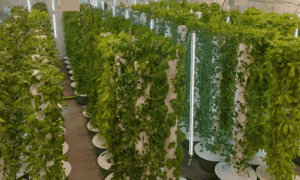Are you tired of the limitations of traditional farming methods? Look no further! In this blog post, we will discuss the numerous advantages and benefits of hydroponics – a revolutionary technique changing the game in agriculture.
With hydroponics, gone are the days of relying on fertile soil or battling soil-borne diseases and pests.
From increased crop yields and water efficiency to precise nutrient delivery, hydroponics offers a host of benefits that can transform the way we grow our food.
Whether you’re a seasoned farmer or a curious novice, this blog post is the ultimate guide to understanding the advantages of hydroponics and the benefits it brings to the table.
Let’s dive into the world of hydroponic farming and uncover its incredible advantages together!
What Is Hydroponic Farming?
Hydroponic farming is a modern and soil-free method of growing plants where nutrients essential for plant growth are directly delivered to the roots through a nutrient-rich water solution. Instead of traditional soil, plants are supported by inert mediums like perlite or coconut coir.
This method offers precise control over factors like nutrient levels, pH, and water distribution, promoting faster growth and higher yields.
Hydroponic farming minimises water usage, eliminates soil-borne diseases, and allows for year-round cultivation, making it a sustainable and efficient approach to growing a variety of crops.
Ready to try hydroponic farming? BNJ Garden is your spot for all things hydroponics! No soil, just faster growth. Easily control nutrients, pH, and water. Grow efficiently and sustainably.
Join us for a greener future! Visit our Hydroponics Manchester shop today and start your hydroponic journey with BNJ Garden!
Advantages of Hydroponics Farming
1. Increased crop yields
Hydroponics, known for its ability to provide optimum growing conditions, offers a significant advantage in terms of increased crop yields. By providing plants with the exact nutrients they need at the right time, hydroponics promotes healthy growth and development, resulting in higher yields.
This advanced farming technique maximises the potential of plants, allowing them to thrive and produce more abundant harvests. With hydroponics, farmers can achieve impressive crop yields that surpass traditional farming methods.
2. Water efficiency and conservation
In the face of water scarcity and environmental concerns, the water efficiency of hydroponics is a game-changer. This soilless farming method uses up to 90% less water compared to conventional agriculture.
By utilising recirculating systems and precise nutrient solutions, hydroponics minimises water wastage while providing plants with optimal hydration.
This water-saving advantage not only helps to conserve a precious resource but also makes hydroponics a sustainable choice for agricultural practices.
3. Controlled nutrient delivery
One of the key advantages of hydroponics is the precise and controlled delivery of nutrients to plants. By directly supplying plants with a balanced mix of essential nutrients in soluble form, hydroponics eliminates the guesswork associated with traditional soil-based farming.
This targeted approach ensures that plants receive the perfect balance of nutrients, promoting healthy growth and maximising productivity. With hydroponics, farmers have the power to fine-tune the nutrient delivery, giving plants exactly what they need for optimal development.
4. Elimination of soil-borne diseases and pests
Traditional farming often faces challenges from soil-borne diseases and pests that can damage or destroy crops. However, hydroponics provides an advantage by eliminating these issues.
By growing plants in a soilless medium, hydroponics creates an environment where soil-borne diseases and pests have no access to the plant roots.
This reduces the risk of infestations and diseases, resulting in healthier plants and higher quality yields. Hydroponics offers a reliable solution for growers looking to protect their crops from the threats posed by soil-borne pathogens and pests.
5. Space utilisation and scalability
One of the notable advantages of hydroponics is its ability to maximise space utilisation and scalability. With hydroponics, plants can be grown vertically or in compact systems, allowing for efficient use of available space. This is particularly advantageous in urban areas or regions with limited land resources.
Additionally, hydroponics systems can be easily expanded or modified to accommodate growing demand. The scalability of hydroponics enables farmers to optimise their production capacity and adapt to changing market needs, making it a flexible and viable option for agricultural operations.
Disadvantages of hydroponics
1. High Initial Setup Costs
While hydroponics offers numerous advantages, establishing a hydroponic system can be a significant financial investment. The initial costs can be daunting, particularly for small-scale growers or individuals with limited financial resources. The expenses involved in setting up a hydroponic system typically include:
Equipment Purchases: The core components of a hydroponic system, such as pumps, tubes, drip irrigation systems, and grow lights, can be costly. The specific costs will vary depending on the size, complexity, and brand of the equipment chosen.
Grow Medium: The selection of a suitable hydroponic growing medium, such as perlite, coco coir, or rockwool, contributes to the initial setup costs. These materials provide support for plant roots and play a role in nutrient absorption.
Hydroponics Nutrient Solutions: Hydroponics Nutrient solutions, containing essential minerals and elements, are crucial for plant growth in hydroponic systems. The initial investment may include purchasing nutrient concentrates or pre-mixed solutions.
Environmental Control: Maintaining optimal environmental conditions, such as temperature, humidity, and lighting, is essential for hydroponic success. This may require additional equipment like climate controllers, grow lights, and ventilation systems.
2. Technical Expertise
Hydroponic systems require a certain level of technical expertise to maintain and operate effectively. This includes knowledge of nutrient solutions, pH balance, lighting requirements, and pest and disease control. Without proper knowledge and experience, growers may face challenges in maintaining optimal plant growth and preventing problems.
3. Susceptibility to System Failure
Hydroponic systems rely on a complex network of pumps, valves, and timers to deliver nutrients and maintain the environment for plant growth. Any malfunction in these components can lead to system failure, which can be detrimental to the plants if not addressed promptly.
4. Nutrient Balance Management
Hydroponic systems require careful monitoring and adjustment of nutrient solutions to ensure that plants receive the proper balance of essential elements. Imbalances in nutrient levels can lead to deficiencies or toxicities that can affect plant growth, yield, and overall health.
5. Susceptibility to Waterborne Diseases
Hydroponic systems use recirculating water solutions, which can increase the risk of spreading waterborne diseases among plants. If a disease outbreak occurs, it can spread rapidly through the system, potentially affecting an entire crop.
Final Thoughts
In conclusion, hydroponic farming presents a groundbreaking approach to agriculture, overcoming traditional limitations and offering a range of advantages, including increased crop yields, water efficiency, controlled nutrient delivery, and the elimination of soil-borne diseases.
While the initial setup costs and technical expertise required may pose challenges, the scalability and space efficiency of hydroponics make it a flexible and viable option for modern farming. It’s a journey toward sustainable, efficient, and space-optimised crop cultivation.
FAQs
Is hydroponic farming suitable for beginners?
Absolutely! While there is a learning curve, many hydroponic systems are designed for beginners with user-friendly features. Start small and gradually expand as you gain experience.
How do I prevent system failures in hydroponics?
Regular maintenance and monitoring are crucial. Check pumps, valves, and timers regularly to ensure proper functioning. Address any malfunctions promptly to prevent system failure.
Can I use hydroponics in limited space or urban settings?
Yes, one of the advantages of hydroponics is its ability to maximise space utilisation. Vertical and compact systems make it suitable for urban areas or locations with limited land resources.
What nutrient solutions are best for hydroponic systems?
Nutrient solutions can vary, but they typically contain essential minerals and elements for plant growth. You can choose pre-mixed solutions or concentrates, adjusting them based on your specific crop needs. Regular monitoring ensures a balanced nutrient intake.



































